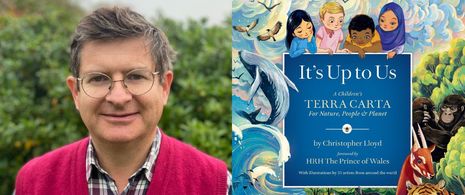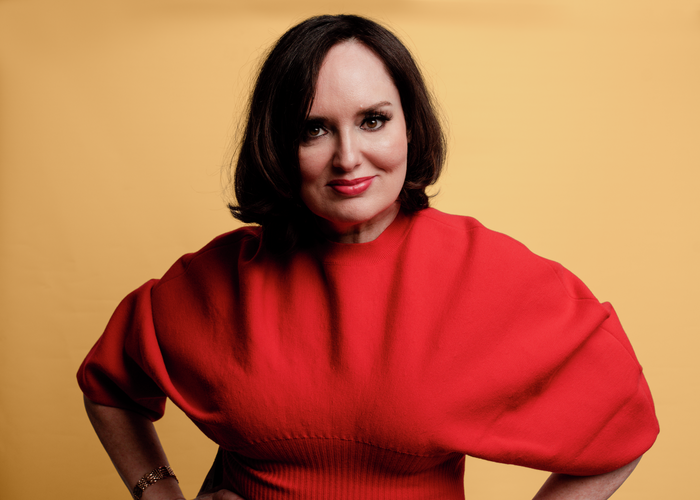“A catalyst for conversations”: Christopher Lloyd on using storytelling to raise climate crisis awareness
Film and TV Editor Catrin Osborne interviews Christopher Lloyd about conveying climate activism to children through his book ‘It’s Up to Us’ and upcoming event at the Cambridge Literary Festival

As a PGCE student, I am inspired by how the climate crisis has captured the attention of primary school pupils. Quickly comprehending seemingly complex concepts, the children are determined to protect their planet; pupils militantly check the recycling bin, engage in heated debates about deforestation, or lament that their parents won’t let them become vegans.
As well as environmental activism, both my pupils and I have an affinity for children’s books. Therefore, I was thrilled to interview Christopher Lloyd about his book It’s Up to Us: A Children’s Terra Carta for Nature, People and Planet (What on Earth Books 2021) before his upcoming show at the Cambridge Literary Festival on Saturday 23rd April.
Christopher Lloyd is a world history author, educator and lecturer, who has written a plethora of children’s non-fiction books such as What on Earth Happened?: The Complete Story of the Planet, Life and People from the Big Bang to the Present Day (2008) and The Story of the World in 100 Species (2011). According to Lloyd, non-fiction can “encourage reluctant readers by emphasising their personal interests.” It’s Up to Us harnesses this spirit as it presents a child-oriented companion piece to HRH The Prince of Wales’ Terra Carta, a charter of aims for the private sector to achieve a more sustainable future.
“If one feels part of nature, they will behave in a way that is empathetic to nature”
Although our meeting was through a Zoom screen, Lloyd’s enthusiasm for the book’s message was evidently clear: “Rather than aim this at business leaders, I wanted to aim the story at young people so we can activate them to motivate the adults in their lives to think differently.”
In his foreword, HRH states that “being young is knowing that we are, in fact, part of Nature ourselves”. Likewise, Lloyd poignantly relays his philosophy that “as we become adults, we see ourselves as apart from nature, because we spend all our time in cars or concrete buildings. As we’re locked away from nature, we forget that we’re part of it. Yet, a child hasn’t had that experience and their brains are instinctively programmed to want to learn about this nature around them.”
I, for one, wholeheartedly agree with this after watching my current pupils’ inquisitive science lesson exploring worms’ habitats; they were all carefree and at-one with nature. The intricate connection between childhood and the environment is hopeful for climate activism according to Lloyd because “if one feels part of nature, they will behave in a way that is empathetic to nature.”
“Lloyd utilises an ancient Greek storytelling device”
In his event at the Cambridge Literary Festival, Lloyd aims to walk the audience through the Terra Carta’s four-part narrative: beginning with the world before humans, detailing how humans have upset natural harmony, explaining the impact on the planet, and concluding with how we can restore balance.
Crafting an interactive atmosphere, Lloyd utilises an ancient Greek storytelling device through his “signature coat of many pockets” stocked with symbolic objects. “By using mnemonics as a means to link our minds and memories to key aspects of the story, the objects can trigger conversation and will be memorable for years to come.” Considering these conversations, Lloyd hopes that children inquire into “why their school doesn’t have solar panels or why they’re eating food from the other side of the world which could be grown here.”
To illuminate the message, It’s Up to Us is adorned with drawings by 33 illustrators from a plethora of national and cultural backgrounds. In turn, the climate crisis “is not all loaded on one culture for blame or solution” and is, as the title decrees, “up to all of us.”
“We need to be persuading people and big organisations, we need to be ambitious”
One of the book’s greatest strengths is how it deviates from the typical individualistic eco-friendly actions for children. Lloyd tells me that, whilst there is merit in the existing advice about individual actions, the book was “inspired by Prince Charles to lift everyone’s chins up to see the long-term. For that, we need a conversation, we need to be lobbying in a sense, we need to be persuading people and big organisations, we need to be ambitious.” Rather than inciting polarity, It’s Up to Us aims to form cross-cultural and transgenerational bonds to resolve this pressing matter.
Lloyd was “keen not to dumb it down and pretend that the climate crisis is not threatening the future of civilisations.” However, he points to the illustrations as a means to transmit the hopeful message rather than create a dystopian climate anxiety-inducing piece of art. As a reader flicks through the pages, they gaze at depictions of environmental refugees and rubbish flooding the oceans, but the book concludes with people of all ages and cultures coming together in a tree planting ceremony.
Although it is child-centred, It’s Up to Us will inspire all parents, teachers, or any other adult that delves through its pages. I ask Lloyd what he wishes my future pupils will take away from the book to which he responds: “I want their heads to be full of questions. It is a celebration of storytelling through art and words and I want it to act as a catalyst for conversations between generations.”
Christopher Lloyd’s show at the Cambridge Literary Festival will be taking place at the Cambridge Union on Saturday 23rd April 2022 at 10:00am-11:00am. Tickets can be found here.
 News / CUP announces funding scheme for under-represented academics19 December 2025
News / CUP announces funding scheme for under-represented academics19 December 2025 News / SU reluctantly registers controversial women’s soc18 December 2025
News / SU reluctantly registers controversial women’s soc18 December 2025 News / Cambridge welcomes UK rejoining the Erasmus scheme20 December 2025
News / Cambridge welcomes UK rejoining the Erasmus scheme20 December 2025 Features / Should I stay or should I go? Cambridge students and alumni reflect on how their memories stay with them15 December 2025
Features / Should I stay or should I go? Cambridge students and alumni reflect on how their memories stay with them15 December 2025 Film & TV / Timothée Chalamet and the era-fication of film marketing21 December 2025
Film & TV / Timothée Chalamet and the era-fication of film marketing21 December 2025










